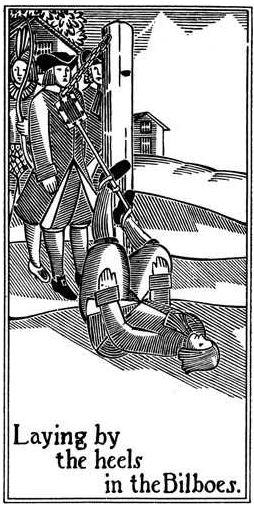settings
Hamlet vocabulary
366 vocabulary words, including people, places, music, artists, etc.
help & settings
[x]
-
bilbo
-
► definition
Definition:1. A rapier; a sword; so named from Bilbao, in Spain.2. pl. A long bar or bolt of iron with sliding shackles, and a lock at the end, to confine the feet of prisoners or offenders, esp. on board of ships.Noah Webster. Webster's Unabridged Dictionary (1913)---They were a simple but effective restraint; a long heavy bolt or bar of iron having two sliding shackles, something like handcuffs, and a lock. In these shackles were thrust the legs of offenders or criminals, who were then locked in with a padlock. Sometimes a chain at one end of the bilboes attached both bilboes and prisoner to the floor or wall; but this was superfluous, as the iron bar prevented locomotion. Whether the Spanish Armada story is true or not, bilboes were certainly much used on board ship.Alice Morse Earle. Curious Punishments of Bygone Days (1896) image: Alice Morse Earle. Curious Punishments of Bygone Days (1896)
image: Alice Morse Earle. Curious Punishments of Bygone Days (1896)
► uses
Uses:
On board the "Duke," however, the bilboes must have been kept in fair working order, with little time to get rusty, for two days after Mr. Page got clear of them, "two persons being accus'd of concealing a peruke, two shirts, and a pair of stockings from the plunder of the Canary bark, are found guilty and order'd into them."
Robert C. Leslie. Life Aboard a British Privateer in the Time of Queen Anne. (1889)
---
Methought I lay Worse than the mutines in the bilboes.WIlliam Shakespeare. Hamlet
---
I would, replied the sheepmonger, take thee such a woundy cut on this spectacle-bearing lug of thine with my trusty bilbo as would smite thee dead as a herring.
Rabelais. Gargantua and Pantagruel
---
The Massachusetts magistrates brought bilboes from England as a means of punishing refractory or sinning colonists, and they were soon in constant use. In the very oldest court records, which are still preserved, of the settlement of Boston—the Bay colony—appear the frequent sentences of offenders to be placed in the bilboes. The earliest entry is in the authorized record of the Court held at Boston on the 7th of August, 1632. It reads thus: “Jams Woodward shall be sett in the bilbowes for being drunk at the Newe-towne.” “Newe-towne” was the old name of Cambridge.
Alice Morse Earle. Curious Punishments of Bygone Days (1896)

